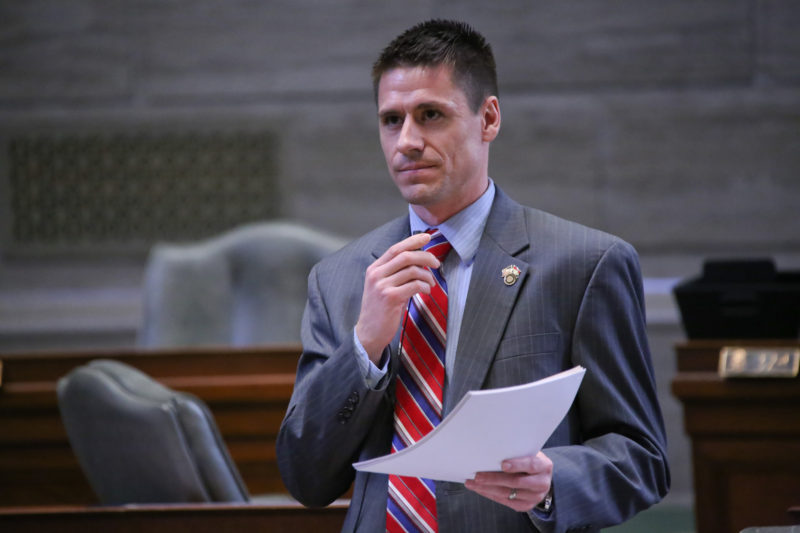JEFFERSON CITY, Mo. — The Missouri Senate heard testimony on a bill that would raise the domestic violence tax credit and add rape crisis centers as a qualifying facility Tuesday.
SB 155 from Sen. Andrew Koenig increases the tax credit offered for contributions to domestic violence shelters to 70 percent beginning in July 2022 — up from 50 percent. It also removes the limit on the cumulative amount of tax credits claimed by taxpayers as well as the sunset.
As Koenig presented his testimony before the Economic Development Committee, the Missouri Coalition Against Domestic and Sexual Violence (MCADSV) reported an increase in contacts by rape crisis centers from October 2019 to September 2020 — even as the COVID-19 pandemic shuttered other businesses. The number of contacts rape crisis centers had with individuals in need of medical assistance following sexual violence increased by 4 percent during that time period, the MCADSV said.
In 2019, more than 9,000 people received services from a Missouri sexual assault program — and nearly 5,500 people requested services that were unmet because the program lacked resources, according to figures from MCADSV.
That same year, more than 36,000 people received services from a Missouri domestic violence program, and an additional 26,000 individuals had needs that went unmet because of a lack of resources, MCADSV said.
“The tax credit is vital to encourage local donations which is needed for a match in federal grant programs and building improvement projects,” MCADSV said.
In addition to the domestic violence tax credit changes, the bill would also increase the tax credits available for contributions to maternity homes to 70 percent in July 2022.
The committee received numerous testimonies in support of SB 155, including from Caitlin Roam, the executive director of The Sparrow’s Nest in O’Fallon. Roam said increasing the tax credit would ultimately save taxpayers as most graduates of The Sparrow’s Nest program remain off welfare after leaving.
“In these unprecedented times, homes like The Sparrow’s Nest face an uncertain future,” Roam said in written testimony. “We know that the role we play is invaluable to both our clients and our communities, yet we face mounting challenges in the areas of increased costs, rising wages, and increasingly complex traumas that our clients present. You and your colleagues can help ensure that organizations like ours are ready to face another decade of serving the most vulnerable Missourians by voting to pass this bill.”
A look at the domestic violence tax credit program
As it stands now, the program is solidified in state statute and allows individuals or corporations who donate at least $100 to shelters approved by the Department of Social Services (DSS) the ability to claim a 50 percent tax credit of the amount given. No more than $50,000 in credits can be claimed per year, and the total amount of tax credits is capped at $2 million — disbursed among the eligible shelters.
DSS reviews the approved tax credits quarterly, according to information from MCADSV, and can redistribute unused tax credits to other eligible shelters.
“A lot of the attention has been on the larger tax credits, which are also important, but we wanted to be able to highlight the benevolent tax credit because … for some of our member agencies who do rely on them, it really incentivizes people not only to donate but sometimes give more money than they otherwise would,” Dochler told The Missouri Times. “It’s really critical for both urban and rural programs, but particularly for rural programs, fundraising is always a challenge.”
MCADSV policy director Jennifer Carter Dochler told lawmakers last year the benevolent tax credits only account for less than 4 percent of credits awarded but noted there is strong accountability seen with the domestic violence shelter program.
Shelters must file with DSS by June 1 annually to be considered eligible for the program, which lasts for an entire fiscal year. And if an agency cannot provide documentation to DSS within a year, the tax credits become void.
For the 2020 fiscal year, 47 domestic violence shelters were approved for the program.
In the House, Rep. Raychel Proudie has proposed legislation creating a tax credit for up to $1,000 for someone who has converted abandoned property into a domestic violence abuse shelter. It also provides up to $500 for taxpayers who have rented residential property to a domestic violence abuse victim.
HB 425 has been referred to the House Ways and Means Committee.

Kaitlyn Schallhorn was the editor in chief of The Missouri Times from 2020-2022. She joined the newspaper in early 2019 after working as a reporter for Fox News in New York City.
Throughout her career, Kaitlyn has covered political campaigns across the U.S., including the 2016 presidential election, and humanitarian aid efforts in Africa and the Middle East.
She is a native of Missouri who studied journalism at Winthrop University in South Carolina. She is also an alumna of the National Journalism Center in Washington, D.C.
Contact Kaitlyn at kaitlyn@themissouritimes.com.












